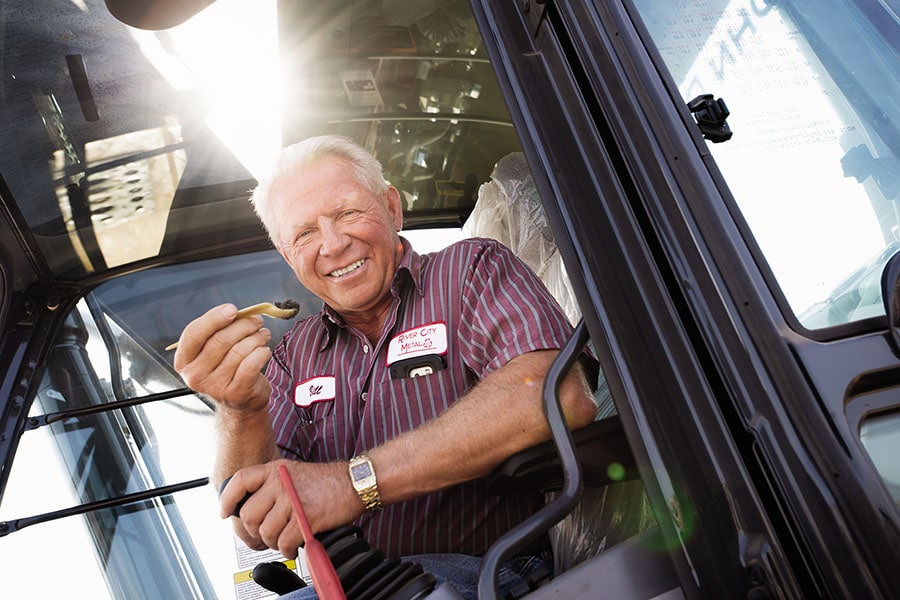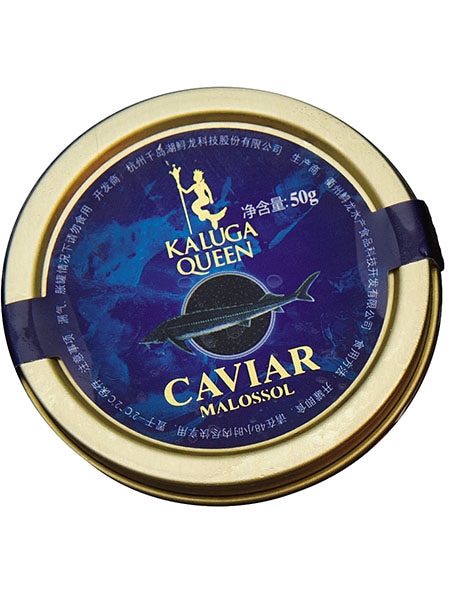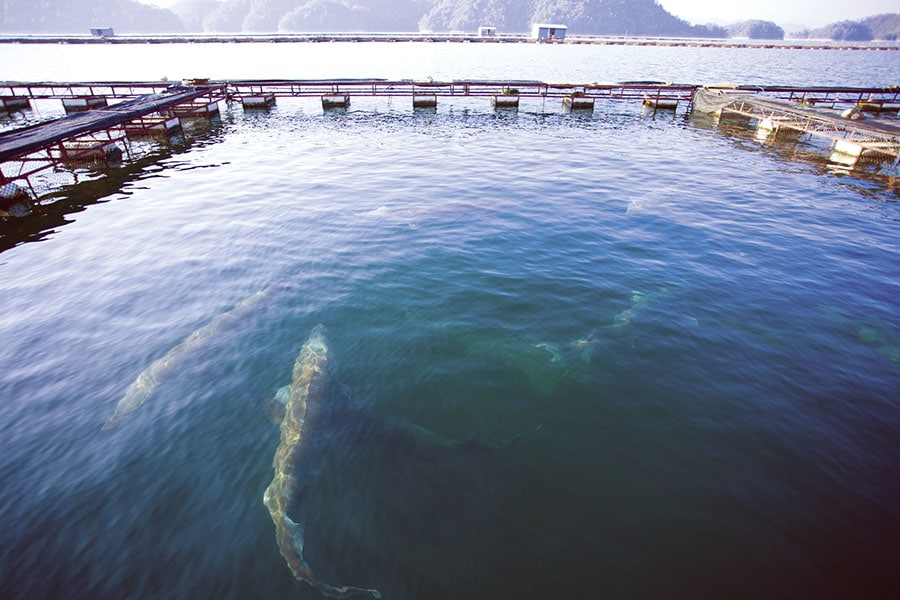
The Accidental Caviar King
The most coveted fish eggs in the world aren't produced in Russia. They're made in China—by Bill Holst, a Wisconsin scrapyard operator
 Roe, roe, roe: Bill Holst samples his goods at one of his quarries in Wisconsin—though he is not a big fan of caviar
Roe, roe, roe: Bill Holst samples his goods at one of his quarries in Wisconsin—though he is not a big fan of caviarImage: Tim Pannell for Forbes
Along State Road 35 on the Wisconsin side of the Mississippi River, there is a junkyard filled with old boats, cars and refrigerators, where 20,000 pounds of aluminum gets melted down every day. A handwritten sign tacked onto the front door reminds all those who enter: Put Shirts On. Inside sits Bill Holst, the 69-year-old blue-jeaned, third-generation corn farmer who started this scrap-metal business 12 years ago. “I see value in things that other people don’t see value in,” he says. “I’m more of a risk-taker.”
All of which explains one of Holst’s more exotic businesses: Hangzhou Qiandaohu Xunlong Sci-Tech, a sprawling sturgeon farm and caviar-processing company based 7,000 miles away at a man-made lake in eastern China. Hangzhou is now the largest caviar company in the world: It controls 30 percent of the global market and will bring in an estimated $35 million in revenue this year. That scale, combined with low labour costs and high retail prices—an ounce can cost upwards of $150—gives the company an estimated 25 percent profit margin. Holst owns about 24 percent of the joint venture and is its single largest (and only American) investor.

But Hangzhou is his jewel. In the two decades since the sale of wild Iranian and Russian caviar was banned worldwide, the farm has become the most sought-after caviar producer in the world. Marketed under the name Kaluga Queen, the eggs are now served at hundreds of award-winning restaurants, including 22 of the 28 three-Michelin-starred establishments in France and Eleven Madison Park in New York City. Famed chef Alain Ducasse has stocked the caviar at his 30 restaurants around the world since he visited the farm three years ago. Vladimir Putin tried some at the 2016 G20 summit.
Hangzhou is also a key wholesale supplier to luxury brands such as Petrossian and Caviar House. Even tins of chef Thomas Keller’s retail brand, Regiis Ova, are packed with Holst’s eggs. “That farm in China has the best-quality caviar,” says chef Eric Ripert, whose $160 seafood tasting menu at Le Bernardin offers an ounce of the caviar as a $155 supplement. “They’re not too salty. They’re not bitter. They’re not nutty. It’s almost as good as wild caviar, when it was on the market. I’m talking about the best wild caviar that you could find 20 years ago.”
Holst himself had a wild ride that brought him to the caviar industry. He dropped out of college in 1968 to work the midnight shift in an insulation factory for $2 an hour. At 22, he started a remodelling business. That led him to buy a quarry in the late 1970s to dig for sand and gravel. By 1995, he owned 11. One site had a spring-fed lake that he stocked with fish so his two children could go fishing. A friend in St. Paul, whose hobby was raising sturgeon in his garage, introduced Holst to a native tribe in Canada that sold him the fish. Holst discovered he had a knack for keeping the fish healthy. In 1999, the friend learned about an opportunity to buy a bankrupt sturgeon farm in Hungary.
Holst had never tasted caviar and had rarely been outside the United States. But he flew to Budapest, holding a briefcase filled with $10,000 in cash to convince officials to meet about buying the company. The Hungarian government agreed to $200,000. Holst paid it all in cash.
 Swimmingly: Qiandao Lake in China, where the sturgeon that produce Kaluga Queen are born and raised
Swimmingly: Qiandao Lake in China, where the sturgeon that produce Kaluga Queen are born and raisedRebuilding began immediately. (Holst was flush with funds after selling his Wisconsin excavating business for $14 million up front and $32 million in royalties that would be paid out over 30 years.) “[The previous owner] wasn’t a farmer,” he explains. “Five percent one way or another in the business is the difference between being profitable or bankrupt. You have to pay attention to all of the little things.” That can be as specific as how a female sturgeon is fed: If she gets even slightly too fat, her ovaries will not produce eggs. Because sturgeon take 4 to 12 years to mature, one misstep can wipe away years of work. While Holst was turning the farm around in Hungary, he bought a bankrupt German caviar company, which he renamed Desietra. Within four years, it was back to making a profit.
A group of Chinese investors then approached him about starting that country’s first caviar company. They already had a small sturgeon farm that sold the fish as meat but needed funds and expertise to expand into caviar production. In 2004, Holst invested roughly $2 million for a 49 percent stake. (He sold back half a few years later as the company attempted to go public in China, which limits foreign ownership.) “I’m what you call an impulsive buyer,” he says. “I look at something and I don’t take ten years to look it over. If it’s a good deal, I do it now because it will be gone tomorrow.”
The first tin shipped from China in 2006. Volume increased quickly from there. “We started getting enough inventory that we didn’t have to take the fish in the first ovulation,” Holst says. “If you wait for the second, you get 3 percent or 4 percent more caviar. Your profit goes up 30 percent to 40 percent. Boom, just like that.” By 2016, Hangzhou had become the largest caviar company in the world, with the next-biggest being a quarter of the size. Last year, production rose 40 percent. It has already increased 30 percent this year.
While Hangzhou intends to stay private for now, Holst plans to reduce his interest in China and invest more in his European businesses. He is looking at new farms in Hungary, Italy and Greece. Such a move would make Holst one of the biggest caviar producers in Europe.
“When I went over and started this caviar business, people thought I was the goofiest guy in the world,” he says, adding that he does not eat much of what he produces. There is not a single tin inside his house, a modest five-bedroom nestled close to his row crops where he lives with his longtime girlfriend, Nancy. “We’re not elaborate people,” he says. “We like the simple things.”
(This story appears in the 30 November, -0001 issue of Forbes India. To visit our Archives, click here.)
X




